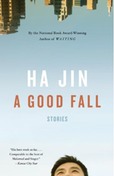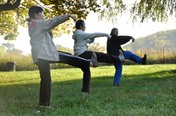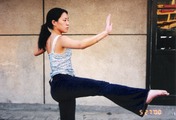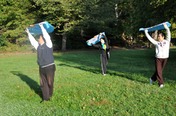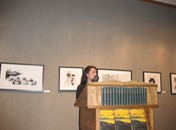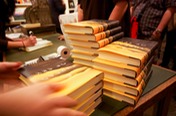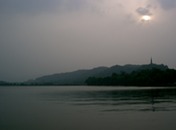Lunch with Ha Jin in Flushing
After reading Ha Jin’s story collection A Good Fall and conducting a Q&A with him via email, I met the National Book Award-winning author last week on the steps of the Flushing library. We knew each other only by our author photos, but there was an instant sense of warm recognition as we greeted each other and, at his suggestion, headed next door for lunch at what happens to be my dad’s favorite spot: No. …
Finding Flushing in the Stories of Ha Jin
As a Chinese American novelist, I tend to resist treating literature as sociological texts. I’ve answered my share of those questions: What does your book tell us about China/China versus America/Asian American women/immigrant families/etc.? …
A Few Incidentals
One recent morning, I went to Kissena Park with my dad and my little sister to explore the tai chi scene. We met up with Teacher Du and two of his students, both middle-aged women with sweet, open demeanors. (They treat him with deep respect and perform tai chi under his guidance, but there’s no payment for instruction.) …
Translating Tai Chi from Beijing to Flushing
I've just begun to explore the tai chi scene in Flushing: visiting my dad’s regular class on Northern Boulevard and an impromptu trio in Kissena Park, talking to a master named Teacher Du and some of his students (who include a number of cancer survivors), and meeting a turtle named Turtle, who sits on a sunny patch of grass while his owner practices under a willow tree, all of which will figure in future posts. …
Finding Serenity in Flushing
Kissena Park, Flushing
When most people think of Flushing, they tend to think of hectic traffic, overflowing street markets, noisy crowds slurping authentically mouth-numbing food. (Unless they think primarily of the Mets, in which case I’m not terribly interested.)
…
Why Writers Should Watch "Jersey Shore"
I used to think of my trashy-TV viewing as a necessary but guilty habit. I spend my days reading fine literature and knocking my skull trying to write it. I've long taught in public schools, and I'm married to an economics reporter, and I come from a family of activists, so dinner conversation tends to not be so light. …
"Find a Chinese Wife Now," Thanks to Ads by Google
After I wrote my first blog post at the Huffington Post ("I Called Amy Tan a Dirty Word -- And Then She Friended Me"), I felt a certain sense of satisfaction. I felt like I'd excavated something difficult about ethnicity and gender and literature and identity. …
Elsewhere in the Blogosphere
I’ve never thought of myself as much of a blogger (as evidenced by the number of entries you’ve seen here, thus far), but here’s a bit of exciting news: I’m about to start blogging about my novel—and lots more—at the…
Publication Eve
I’ve never enjoyed eves—Christmas, birthdays, New Year’s. I don’t do well with build-up; my version of excitement mostly consists of waiting to be bludgeoned by disappointment. So I either try to pretend the event isn’t happening, or I expect the worst while secretly praying to be slightly, pleasantly surprised. …
A Poem: "The Modernist Impulse/On My Birthday"
West Lake, Hangzhou, China
Today, the first of March, is the sunniest, warmest day we’ve had in months, I think, with the snow from last week’s storm pooling on the sidewalks and cascading from the scaffolding, and I’m reminded of a poem that I read during the writing of …
About Writing
In launching my first blog, I’ve decided not to chronicle the ups and downs of the launch of my first novel—for the sake of my own sanity, and thus the sanity of those around me, and maybe yours as well. All I’ll say is that it’s both exciting and extremely nerve-racking; that working on my next novel would probably be more productive than pondering marketing strategies for this one; and that the comparisons to Amy Tan, however complimentary, are getting a tad worn out. …
Lunch with Ha Jin in Flushing
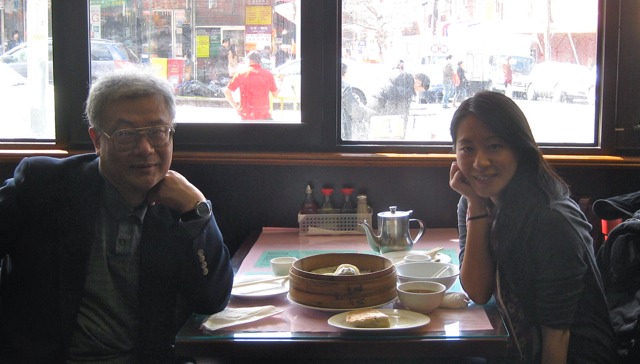
After reading Ha Jin’s story collection A Good Fall and conducting a Q&A with him via email, I met the National Book Award-winning author last week on the steps of the Flushing library. We knew each other only by our author photos, but there was an instant sense of warm recognition as we greeted each other and, at his suggestion, headed next door for lunch at what happens to be my dad’s favorite spot: No. 1 East Restaurant, better known as “Ren Ren” (literally translated, People People).
With his wire-rimmed glasses and rumpled gray hair, Ha Jin didn’t seem to trigger any recognition from passersby on Main Street, let alone our waitress. She seemed baffled and a bit irritated by how long it took us to order. To be fair, it took us a very long time to order.
First, there was plenty of thanks and admiration to be expressed, along with basic background information to exchange, before I felt like I could get down to eating. So while we held our menus, we discussed how much I enjoyed reading about my hometown of Flushing in his stories, what had brought him to New York from Boston this time (a talk at Long Island University’s Brooklyn campus), and why he chooses to stay in Flushing every time he visits (in brief, he enjoys it, especially the bookstores and the food).
Then we stared at our menus and spiraled into a cycle of Chinese-style politeness that we both seemed unable to break. It went something like this:
“What would you like to order?”
“What looks good to you?”
“I eat everything.”
“They have lots of seafood.”
“I like seafood.”
“So you would like to order seafood?”
“Sure, if you would.”
(A long pause, during which neither of us is able to name a seafood dish.)
“Is there something else you’d like to order?”
“How about … soup?”
“Soup is good. Which soup?”
“Which soup would you like?”
After a few more minutes of this, Ha Jin suggested hot-and-sour soup. I cheerfully agreed while my thoughts churned. Was Ha Jin suggesting hot-and-sour soup because he figured it was the kind of thing an ignorant, American-born kid like me would eat? Of course, plenty of Chinese people enjoy hot-and-sour soup, including me, my dad, and maybe Ha Jin. In that case, was Ha Jin ordering it for himself or did he mean for us to share it? If the former, was that because he figured I practiced that crude American custom, or because he actually wanted it for himself? Either way, what was I supposed to order to accompany hot-and-sour soup?
At last, the waitress stood over us with her pen raised, unsmiling. Ha Jin ordered the hot-and-sour soup. In a panic, I blurted out a couple of the dishes I always order with my dad: sweet soybean milk and a fried leek pancake.
At this, Ha Jin chuckled. “That sounds good,” he said.
“Oh.” I smiled in relief. “Well, then—” I rattled off the rest of the list: steamed vegetable dumplings and thin-sliced beef rolled in a sesame pancake. It was understood: we’d share everything.
Now we relaxed, and ate, and talked. We talked about how, in my lifetime, the Chinese population has shifted from Taiwan-bred émigrés like my parents to the mainlanders filling the streets today. We talked about a few of his favorite Flushing spots, including the Little Lamb hotpot restaurant and the World Journal bookstore, both of which appear in A Good Fall. And we talked about the tendency of both Chinese and American readers (and the American publishing industry) to prefer books about “real Chinese people” or “real Americans”—that is, to shrug off stories about Chinese Americans, American-born or immigrants. Unfortunately, there is a generally sound business rationale behind this bias, but, as Ha Jin said, “This is a moral issue.”
We talked about our mutual love of Chekhov, and how he influenced Ha Jin’s own writing. We compared the philosophies of Boston University’s MFA program with those of the Iowa Writers’ Workshop, which I attended. We discovered a mutual affection for Sigrid Nunez, who is about to become a teaching colleague of Ha Jin’s at BU. And we plumbed our mutual distaste for the current fashion of celebrating certain authors who seem to prioritize cleverness, irony, and experimentalism for their own sake over sentence-level craft, character, and real feeling.
We couldn’t finish everything we ordered, though we did a pretty good job with the hot-and-sour soup. Ha Jin was headed to the Port Authority to catch a bus back to Boston; I was headed to my publisher’s to sign a batch of paperbacks, though I figured I might try to meet up with my dad for a little while. Ha Jin (himself the father of a grown son) said I should definitely call my dad, so after we hugged goodbye, I did.
My dad was a trifle annoyed that I hadn’t called earlier, because twenty minutes before, he’d had an ideal parking spot on Main Street. Still, unaware of where I’d just eaten with Ha Jin, he told me to meet him for lunch at “Ren Ren.”
Originally published at Open City: Blogging for Urban Change
Finding Flushing in the Stories of Ha Jin
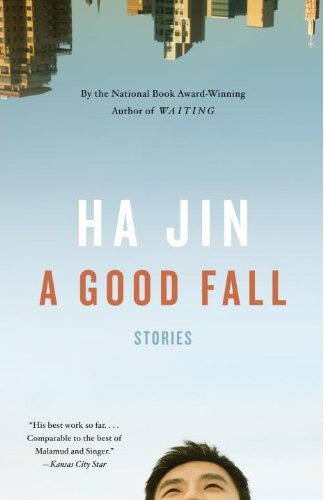
As a Chinese American novelist, I tend to resist treating literature as sociological texts. I’ve answered my share of those questions: What does your book tell us about China/China versus America/Asian American women/immigrant families/etc.? And while I always appreciate the intent behind those queries (truly!), I try not to impose that framework on other authors, particularly when their characters are people of color, female, working-class, or otherwise “other.” I don’t want their creations to carry the burden of being representative. I want to let them live and breathe, to simply showcase the art of a writer.
But this week, as I started to read Ha Jin’s A Good Fall, I found myself unable to stop taking mental notes on what this book reveals about the neighborhood of Flushing. Of course, it’s become almost compulsory for the Timesand New York magazine to rhapsodize over Flushing restaurants—often with a Columbus-style tone of discovery. But A Good Fall is the first book I’ve read that delves straight into the inner lives of its inhabitants, a group so often invisible in mainstream culture, not to mention literature, that I can completely understand the temptation for readers—myself included—to view these stories as sociological documents.
All of Ha Jin’s characters are recent Chinese immigrants: a sushi restaurant waitress whose sister in Sichuan harasses her to send money so that she can buy a car; a male sweatshop worker who becomes a driver for three prostitutes; an English professor who has a nervous breakdown when he signs off his tenure application letter with “Respectly yours”; a young monk left penniless and undocumented by his temple master, who secretly keeps a wife and a BMW on Long Island.
As I read their stories, as much as I’m admiring Ha Jin’s surprising turns of phrase, the sympathy and insight he extends to even minor characters, the plain honesty of every detail and feeling, it’s almost impossible not to draw conclusions about the hopes and struggles of the population his characters seem to embody—which I’ll explore in more detail in a following post.
For today, I wanted to explore a reaction that seems still more primal—maybe even primitive. I grew up in Flushing, and I have to admit that my first, most basic reaction to the book went something like, Hey, Taipan Café on Roosevelt Avenue—I know that place! Obviously, I’m not the only individual who has sampled Taipan’s coconut tarts and pork buns. But for those of us who’ve grown accustomed to rarely seeing our worlds depicted in print, there’s a deeply personal quality to that jolt of recognition, almost as if the author is directing that reference straight at us.
I often felt like Ha Jin’s characters were taking me on a tour of my hometown. In “A Composer and his Parakeets,” a composer buys millet for his absent lover’s bird at Hong Kong Supermarket, where my family often buys groceries, mostly because of the free parking. In “Choice,” a tutor and his student’s mother begin a romance outside a hotpot restaurant named Little Lamb, which I’ve passed by wistfully but have never tried because the rest of my family can’t stand lamb. In “The Beauty,” a jealous husband picks up the World Journal at the Chung Hwa Bookstore, where I spent many bored hours as a child with my grandmother. The same husband later finds himself on a gurney in Flushing Hospital, where my mother gave birth to me and my sisters. I could go on and on.
The truth is, while this way of digesting a book might not be very literary, it’s often a powerful pleasure for readers and a formative experience for writers. The Nigerian writer Chinua Achebe has spoken of how his early attempts at writing were stymied by his sense that only the English countryside was a setting fit for literature. The Caribbean poet Derek Walcott once betrayed the anxiety of trying to emulate the canon, whereas Omeros is a landmark achievement in depicting his native island of St. Lucia as a place as worthy of an epic poem as the worlds of Homer and Odysseus.
When I was a little kid, I wrote my share of stories about golden-tressed, green-eyed girls named Vanessa and Crystal. And while I’ve come a long way since then, I still remember the first time I workshopped a story that described a check-cashing store on Kissena Boulevard.
Maybe political dangers will always lurk in imposing a sociological framework on works of literature. But maybe that impulse, at heart, arises from a basic pleasure of reading: finding the foreign in the familiar and the familiar in the foreign.
I’d love to hear from readers: Have you seen other literary depictions of Flushing? Of your own neighborhood? What works of fiction have given you that jolt of self-recognition?
Originally published at Open CIty: Blogging for Urban Change
A Few Incidentals
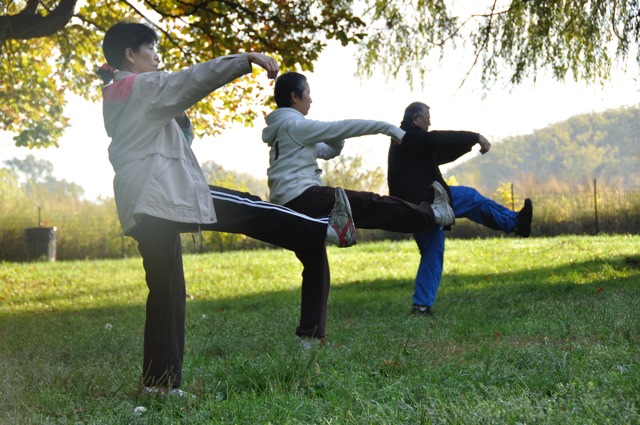
One recent morning, I went to Kissena Park with my dad and my little sister to explore the tai chi scene. We met up with Teacher Du and two of his students, both middle-aged women with sweet, open demeanors. (They treat him with deep respect and perform tai chi under his guidance, but there’s no payment for instruction.) Several routines were practiced, one that Teacher Du himself had choreographed. But, in retrospect, it’s the incidental moments, the little things that happened off to the side, that seem central to the intimate serenity of that morning.
Gathering pu gong ying
When we arrived, the trio were crouched in the grass, gathering leaves from the ground, their manner lightly absorbed, unhurried. They were gathering, I was told, pu gong ying—which, if Google serves, translates as dandelion leaves—into plastic bags. They were careful to snap them off by the stems, rather than pulling them up by the roots, so that the leaves would soon grow back. According to Teacher Du, the leaves aren’t meant to be eaten; one of the women, Auntie Huang, would brew them briefly and drink the liquid. Auntie Huang has short, slightly graying hair and a beautifully smooth, gentle face. In traditional Chinese medicine, pu gong ying is said to treat such various conditions as cancer, diabetes, and heartburn.
It was only later, when Teacher Du made a reference to Auntie Huang’s hair having grown back nicely, that I learned she has just undergone extensive treatment for breast cancer.
A Depressed Turtle Named Turtle
When the pu gong ying had been gathered, Auntie Huang reached into her bag and plucked out a turtle. She’d brought him out to get some sun. When Teacher Du asked if the turtle had a name, she said, “You can call him Turtle.” (In Chinese, the pronoun is gender-neutral; I’m assigning the maleness.) Every now and then, between routines, Auntie Huang would check on Turtle. He never seemed to have moved, but the sunlight did, through the willow trees, so she’d pick him up from his newly shady spot and set him down again in a patch of sun. I mentioned that he must be happy. Actually, she said, she thinks he’s depressed; he hasn’t been eating, drinking, or moving. Indeed, even when a big, unleashed dog bounded nearby, Turtle stayed still.
Feeding Swans
The reason the group was practicing in Kissena Park that week, rather than in the Queens Botanical Gardens, where they’d first met one another nearly ten years ago, was that “the swans are back.” When practice was over and my father, my sister, and I took our leave, Teacher Du insisted on giving us a bag of bread crusts. As soon as we stepped to the edge of the pond, two large swans swam up, snorting, along with a few deferential ducks. It occurred to me that you’re not supposed to feed wildlife, but the moment was hard to resist.
Teacher Du had told us the swans would feed right out of our hands, but I thought they had mean faces. (The animals that have bitten me include a horse, a dog, and a duck.) I tossed a few scraps of bread (once, accidentally hitting a swan in the neck) and let my dad hand out the rest. The birds gulped the pieces of bread that were tossed close to their beaks, though they didn’t expend much energy in swimming after the scraps. They seemed well-fed—probably by Teacher Du.
The three of us, on the other hand, were starving. We emptied the bag, then headed off to Fay Da Bakery to pick up curry pastries and pineapple buns for our own breakfast.
Originally published at Open City: Blogging for Urban Change
Translating Tai Chi from Beijing to Flushing
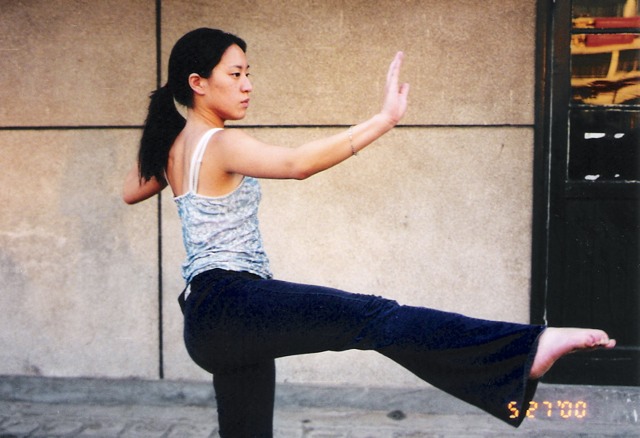
Beijing, China
I've just begun to explore the tai chi scene in Flushing: visiting my dad’s regular class on Northern Boulevard and an impromptu trio in Kissena Park, talking to a master named Teacher Du and some of his students (who include a number of cancer survivors), and meeting a turtle named Turtle, who sits on a sunny patch of grass while his owner practices under a willow tree, all of which will figure in future posts. But what keeps coming to mind right now are my own memories of studying tai chi in Beijing, more than ten years ago.
I was a complete newcomer to tai chi then, and my fellow students were, like me, language students in China, newly arrived from the US and the UK. For us, learning tai chi was akin to practicing our character strokes, eating local street food, sleeping on the wooden planks in our dorm, taking fifty-five hour train rides during school holidays to the southern provinces: one more way to immerse ourselves in the country we’d come to study.
Our teacher was a compact, wiry, baby-faced 25-year-old local who had us call him Willy. A nationally ranked kung-fu champion, he now made a living appearing as an extra in martial arts soap operas—and teaching clumsy foreigners, for whom nothing was too basic: how to bend our knees, how to balance, how to breathe.
I was the only person of Chinese descent in the class, and I seemed to have a little bit of innate facility. After a lifetime of straining to reach subway handrails, my height was an asset. Willy sometimes likened tai chi movements to a cat’s: tensile, artful, close to the earth, ready to spring. When he explained the proverbs behind certain movements—white cranes, horses’ manes, cloud hands, a needle at the bottom of the sea—my body seemed to comprehend.
As the weeks went by, most of my classmates fell away, and some mornings, it was just Willy and me, each a little embarrassed for the other, practicing in a little cracked courtyard where the university staff hung their laundry. One of my favorite ways to explore Beijing became watching groups of elderly men and women performing tai chi routines in perfect unison and silence, with exquisite slowness and grace, on random squares of pavement while the city roared around them.
By the end of the year, I felt I’d learned at least one routine, the 24-form, the way other kids learn to ride a bike: the body remembers. Back at my parents’ house in Flushing, I decided to teach it to my dad.
He was nearing sixty, and long days of driving a van and delivering florist supplies were taking a toll on his joints. No one in my family had ever been a regular practitioner of American-style exercise; running, hiking, swimming, weightlifting, not for fun but as a form of working out one’s body, had always seemed vaguely absurd to us. Tai chi, by contrast, now felt deeply elemental to me. A tradition that had passed from masters to schoolchildren for centuries, an ancestral thread that broke off at my father’s generation—until I traveled to Beijing and picked it up again.
My father had viewed my learning tai chi much the same way he’d viewed my desire to move to the country his family had fled a half-century before: a strange and somewhat amusing turn of events. When I offered to teach him what I knew, he scoffed. When I offered again, he chuckled. When I persisted, he sighed and followed me outside. He’s an amiable guy.
Our lessons lasted about two days. Maybe the process of translation that had transferred knowledge from Willy to me in Beijing got jumbled in my attempt to relay it to my father in our driveway. Maybe no daughter should try to teach her father anything. We didn’t argue, exactly; we just agreed to call it off.
In the years since, I’ve let my tai chi lapse. Meanwhile, my dad has become a total devotee. On his own, he signed up for lessons with Teacher Du. Two evenings a week, he meets with his classmates—all immigrants from China and Taiwan, mostly empty-nesters—to practice in a community center on Northern Boulevard. Early weekend mornings, he watches and sometimes joins the tai chi groups proliferating in the neighborhood parks. He has advanced way past the 24-form to the 42-form, the 58 form, forms that use swords and fans. He has helped recruit students, find new spaces, and organize exhibitions.
I knew all of this, how tai chi has become an organizing principle in his life, but it wasn’t until I visited his class the other night that I truly saw it: the fluidity of his movements, the particular thwack of his kick, the look of perfect concentration—and stillness—on his face. And I’m reminded of the obvious: I have a lot to learn from my dad.
Originally published at Open City: Blogging for Urban Change
Finding Serenity in Flushing
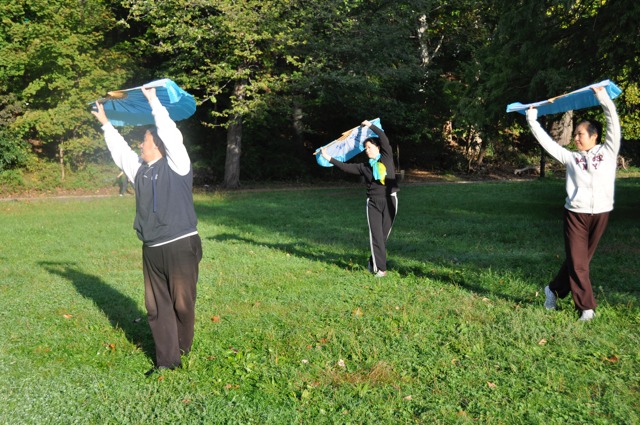
Kissena Park, Flushing
When most people think of Flushing, they tend to think of hectic traffic, overflowing street markets, noisy crowds slurping authentically mouth-numbing food. (Unless they think primarily of the Mets, in which case I’m not terribly interested.)
But, as I recently discovered, there are also scenes like the one above unfolding every morning just blocks away.
I was born and raised in Flushing, and it wasn’t until I moved to Beijing about ten years ago that I became familiar with the sight of flocks of casually dressed, middle-aged locals practicing tai chi in perfect unison in ancient parks, in the Temple of Heaven, in parking lots, on street corners—on seemingly any square of pavement, so many of which appeared and disappeared and appeared again in those days of urban development at warp speed. I decided to learn the discipline, and I found that amid the tumult of life in a city of twenty-million-plus, there was nothing like focusing on a movement like “cloud hands” for a few minutes in the morning.
When I returned home to New York, I feared I’d lose my tai chi forever. Partly to keep my own memory fresh, I tried to teach it to my dad, who was skeptical. It was a badly conceived plan, quickly abandoned—and soon, amid the daily grind of long work hours and long commute times, I gave up trying to keep up my own practice, too.
But in the years since, tai chi groups seem to have sprung up all across Flushing—out in the open, in Kissena Park, the Queens Botanical Gardens, even the tiny playground where my sisters and I used to seesaw, as well as inside numerous church basements and nondescript buildings along Northern Boulevard. I’m sure there have long been a few practitioners of tai chi in the area, but it seems that now they have burgeoned into a great, kaleidoscopic community—one that now includes my father. He’s pictured above, in the blue track pants, alongside Teacher Du, a tai chi master from China who has become one of his closest friends.
Now, for Open City, I plan to have my father guide me through the places where tai chi is flourishing across Flushing, from the public parks to the hidden interiors, from formal classes to impromptu gatherings. In spending time with members of these communities, I plan to explore how they arrived at the discipline; whether they came to it fresh or carried childhood memories of, say, gym class in China; how it might have shifted their use and definitions of public and private space; how tai chi might figure in their own sense of themselves as immigrants and as citizens.
And how all of this might open a new window for me onto a neighborhood I thought I knew.
Originally publshed at Open City: Blogging for Urban Change
Why Writers Should Watch "Jersey Shore"

I used to think of my trashy-TV viewing as a necessary but guilty habit. I spend my days reading fine literature and knocking my skull trying to write it. I've long taught in public schools, and I'm married to an economics reporter, and I come from a family of activists, so dinner conversation tends to not be so light. When I curl up to watch TV, I can do without substance. I prefer gossip, hookups, catfights. I want to gawk at clothes, hair, implants.
Lots of reality shows have satisfied these requirements over the years: Rock of Love, Real Housewives, The Millionaire Matchmaker (even though Patti Stanger is kind of a hideous person). As does MTV's Jersey Shore, which completes its second season tonight and has already bestowed on our culture such iconic images as Jwoww's physics-defying halter tops, Snooki getting punched out by a Queens gym teacher, and Mike sitting down with an egg sandwich to watch Pauly get it on with a girl who's "DTF" (uncomfortably, my initials) at six in the morning.
But this week, as I started to anticipate Jersey Shore withdrawal, it occurred to me that the show isn't just great trashy-TV. Or even just great TV. It's some pretty great storytelling, and it holds some valuable lessons for literary folks like me. (I realize I'm running the risk of sounding archly hip, in the way that Gawker appends to every mention of the show the tagline, "the most important sociological experiment of our time." But I'm serious.)
Take character development. Initially, we might've tuned in just to snicker at those orange-skinned, big-haired, self-proclaimed Guidos and Guidettes, but the show has cumulatively revealed each of these kids as fully, gloriously human. Every episode contains scenes that define the fundamental character of each cast member--as well as scenes that complicate that picture. Each of them is given space to be shape-shifting, to surprise us, to alternate between self-awareness and self-delusion.
Thus, we know Mike as a reptilian predator--and as someone who hankers for peaceful group dinners, who gives us surprisingly dead-on commentary. We can't help feeling invested in their travails, whether involving a gelato scoop or a cheating boyfriend. By now, we intuit the differing nuances each time Snooki flounces off in her fuzzy slippers or Sammi tells Ronnie to "do you." Even the widely despised Angelina, who comes closest to a flat character, exhibits something almost endearing in her dating moxie, her amazing ability to be totally bitchy while preserving not a shred of dignity, even the way she incessantly yanks at the hem of the dress her mother sent (which is indeed, as her mother feared, too small).
Entwined with all this are issues of gender and ethnicity--depicted more honestly than in much of today's fiction. As is oft-noted, some of the cast members aren't Italian; they claim the Guido/Guidette identity as a lifestyle, a culture. Snooki, who was adopted from Chile, simply calls herself tan. These traits are part of the continuum of their characters, not plot points, not symbols, and not all-defining. Similarly, in terms of gender, the girls declare their man-eating abilities, yet find themselves calling Angelina a whore--and acknowledging the double standard. They engage in talk of female empowerment and solidarity, take pride in not cooking and cleaning, and freely pick fights and smack guys in the face--secure in the knowledge that those guys won't "do something about it." Which isn't to say that's progress--only that it captures the complicated, often contradictory, and generally fluid ways in which these aspects of our identities are actually lived.
Then, the show is viscerally funny, inducing cringes, guffaws, and dropped jaws in roughly equal measure, in the way that few books seem to be. As in that indelible hot tub scene where a visitor's "chicken cutlet" floats out of her bra and up to the surface. Maybe my sense of humor is unevolved, but too often, I pick up a novel that's been described as hilarious, only to find that the laughs are mostly located in the author mocking his own creations for being less clever than he and his reader. Jersey Shore is funny in the way life is funny, accidentally and intentionally, with sudden bursts and slow buildups, with someone in on the joke or getting the joke right along with us.
Perhaps most of all, I'm struck by how much material must have been gathered for the show's editors to cull what they did. Nearly every scene depicts at least one line of tension, and the following scenes advance each tension until the conflicts break open, one after another, with suitable lulls in between: meticulously choreographed fireworks. Some of this is due simply to the casting and premise--but much of it is due to the editors, who were obviously ruthless in their selection. They cut the dull scenes that went nowhere and, likely, some hugely entertaining scenes that didn't advance the story. Similarly, a writer's craft involves wading through no end of sludge in order to gather our pearls. It's only when we find each pearl that we realize the rest is sludge. And by then, the sludge is hard to shake -- but that's our duty. There's no other way to arrive at the economy and clarity that mark good literature -- and Jersey Shore.
Finally, there's a difference between that kind of ruthless editing and the fake, icky staging that taints other shows like Keeping Up with the Kardashians. Similarly, writers often navigate a tricky path between manipulating our characters through the machinations of our plots and leaving them to muddle through a story that's ill-defined and fuzzy. Some of us like to call that ambiguity -- but it isn't. Real ambiguity, the right kind of ambiguity, is when there's absolute clarity about what happened -- and very little about what it all means. That's up to the reader.
The people behind Jersey Shore get that. As viewers, we're shown every event that led, for instance, to Sammi and Jwoww's brawl, from the three-way kiss to the unfortunate letter--but the debate rages on over who won, who was right, why they shouldn't have done what they did, and how the hell Ronnie emerged unscathed.
And for that, I thank them. Seriously.
Originally published at the Huffington Post
"Find a Chinese Wife Now," Thanks to Ads by Google
After I wrote my first blog post at the Huffington Post ("I Called Amy Tan a Dirty Word -- And Then She Friended Me"), I felt a certain sense of satisfaction. I felt like I'd excavated something difficult about ethnicity and gender and literature and identity. In my small way, I'd complicated the picture of Asian American women. And readers had responded. Together, we'd added to a much larger conversation.
That's what I was thinking, anyway, when I scrolled down my article to respond to the latest comments and saw this ad wedged between my own earnest sentences about fetishization and pigeonholing:
Ads by Google
Find A Chinese Wife Now
Find Your Someone Special With Us Beautiful Chinese Women. Join Free!
www.ChnLove.asia
Like most Asian American women, I'm familiar with depictions of us as exotic objects for sale. But somehow it seems like there should be some mechanism -- automated shame? irony-overload protection software? -- to keep my own name and photo from aiding in that promotion.
No such luck. When I revisited a few other blogs that had posted author Q&As or reviews of my novel, I saw ads for "Hottest Orient Girls," "Asian Women Best Price," and so on. Of course, if you google some variation of "Chinese/Asian women," nine results out of ten will offer more of the same (and the tenth probably refers to foot-binding). Maybe you'll get one of these offers by the time you scroll to the bottom of this page.
I wish this were just a quirk of the Web, but I think it underscores the fact that contending with these images is still, for most Asian American women, an everyday reality. No matter where we work or how we dress, we're prone to getting mistaken for subservient brides, masseuses and hookers. Usually, of course, it's more subtle -- say, a certain leer or a knowing wink in referring to so-and-so's "Asian girlfriend."
This isn't a novel observation -- and it's taken me weeks to write this post partly because a voice in my own head keeps scoffing, Oh, come on, not this again. But it's one that seems to bear reexamining.
The disconnect between that enduring stereotype of submissive sex objects and the Asian women I know in real life was partly what impelled me to write my novel A Thread of Sky, the story of a family of six Chinese American women, each strong-willed and independent-minded to a fault, who reunite for a tour of China. When I spoke about this during my recent book tour, some readers expressed surprise that stereotyping is still an issue for us. I should probably mention that none of these readers were Asian. They'd had Asian female colleagues, friends and significant others who were so the opposite of the stereotype that they'd assumed we were over this already.
I can understand the assumption, but I'd venture to guess that at least some of those Asian females were like me and many of my peers and the characters in my novel: We're driven to embody the opposite of that stereotype precisely because it still surrounds us. Until we defy it, it defines us by default.
Which isn't to say that all Asian American women spend our days agonizing over being stereotyped. It's more like a background noise, a persistent buzzing. Mostly we ignore it. Sometimes we laugh it off or forget about it. Sometimes we decide it's worth a fight. And every now and then we wonder if we're the only ones who hear it. We're almost relieved when something like Google Adsense makes it explicit, because at least that shows we're not crazy.
The three American-born daughters in A Thread of Sky are more attuned to that buzzing than most because they've been raised to view their personal lives through the lens of political struggle and to strive to "make a difference by being different." While the struggle was overt for their grandmother, a former revolutionary and feminist leader in China, their battles are more abstract: getting compared to "Hotorientalbabes.com" by a coworker, getting mistaken for a Beijing prostitute, worrying whether a boyfriend has "yellow fever."
You could call them hypersensitive, and they probably wouldn't disagree. In the course of the novel, they come to see how, in constantly striving to demonstrate their strength and independence, they "forfeit a measure of their humanity," as one reviewer put it. They learn that sometimes they need to stop proving themselves and simply be.
Like them, I've learned to pick my battles. The reality is that anytime I write about myself, my peers, or my characters in a space that can be monetized, my own words are liable to become a platform for advertising Asian women like discounted designer watches. Maybe this speaks to the limits of literature. Or of Google Adsense. Maybe it's just something to laugh off. I'm still not sure, but I fear this reality is here to stay.
Originally published at the Huffington Post
Elsewhere in the Blogosphere
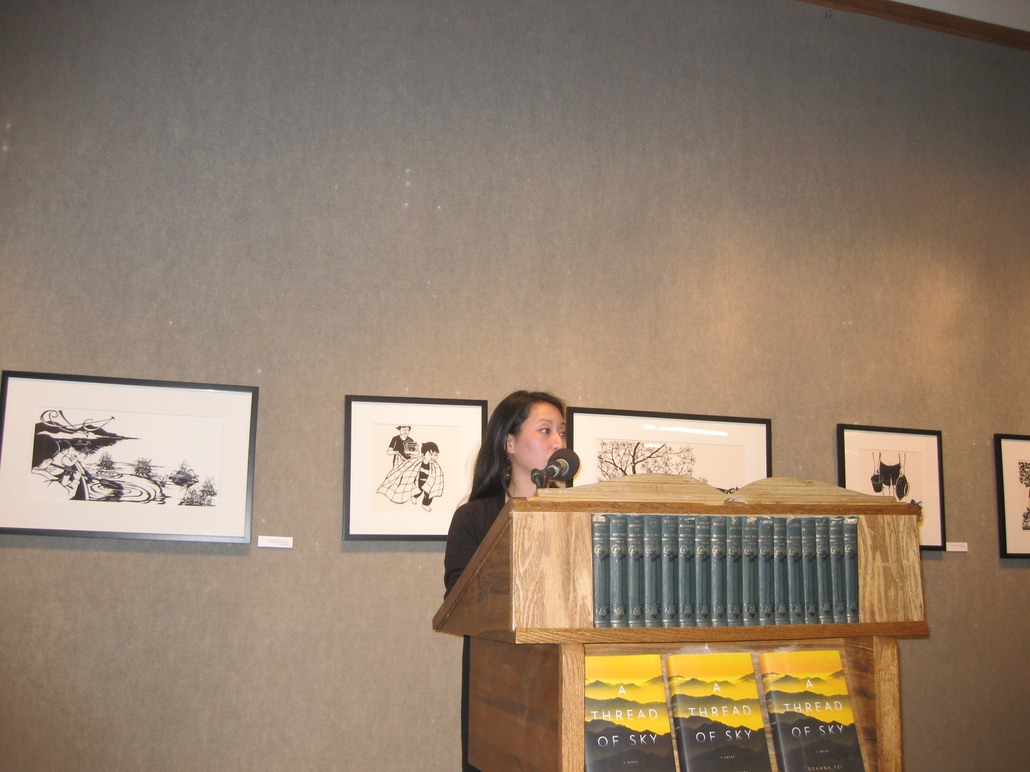
I’ve never thought of myself as much of a blogger (as evidenced by the number of entries you’ve seen here, thus far), but here’s a bit of exciting news: I’m about to start blogging about my novel—and lots more—at theHuffington Post! Look out for my first piece this week, in which I discuss the many hazards of Amy Tan comparisons for younger Asian American writers—specifically, yours truly.
If you prefer to visit this website, have no fear: my entries will continue to be posted here as well.
In the meantime, since I’ve so badly neglected this blog over the last weeks, I’ve compiled a sampling of what I’ve been up to:
- A feature about the songs that inspired me during the writing of A Thread of Sky on Largehearted Boy’s “Book Notes”
- An essay, “A Different Species: A Chinese American Writer in China,” up at The Millions
- An interview with editor Sam Tanenhaus on the New York Times Book Review podcast
- A short story, “Born Again,” at Five Chapters
- A video interview on the Fulbright YouTube channel
- A feature on “The Page 69 Test”
- An interview on WBAI 99.5 FM’s Asia Pacific Forum
- Q&As at The Oregonian, Danwei, The Apopcalypse, and Adoption. Et Cetera.
By the way, the photo above was taken at the last stop on my book tour: the great Powell’s in downtown Portland, OR, on May 27th. As you can see, the podium was probably built for someone a little taller. Not until after I had finished my final book talk, reading, and Q&A did anyone mention that they couldn’t actually see my face.
I’m pretty sure there’s a metaphor in there for what it’s like to be a debut literary novelist.
As always, feel free to leave a comment, submit a question for my FAQ page, or just say hello. And please visit again for more, very soon!
Publication Eve
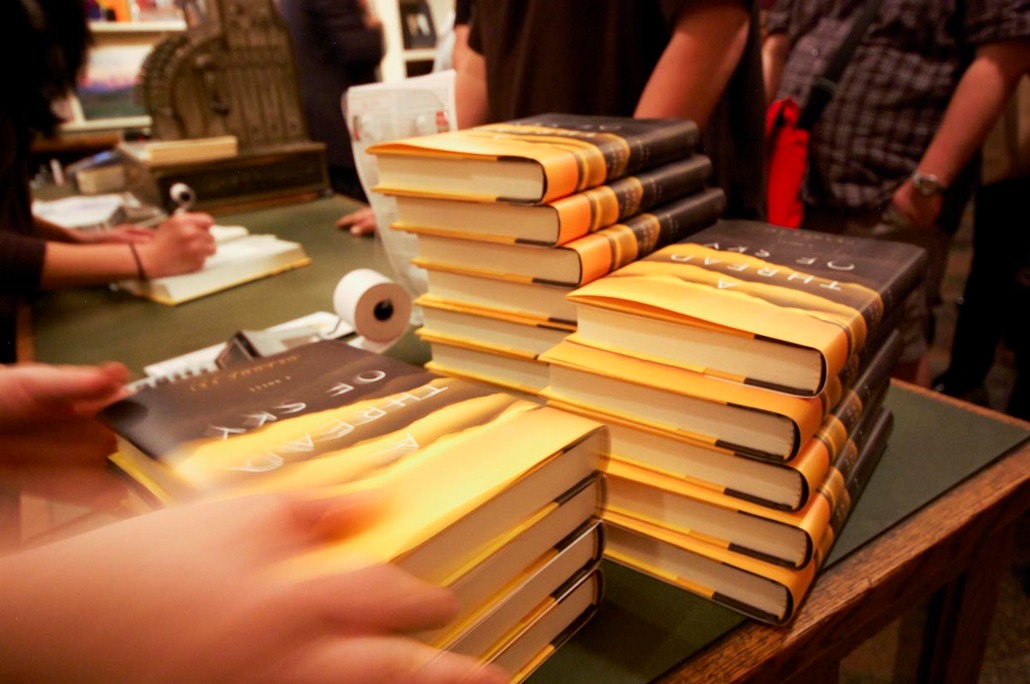
I’ve never enjoyed eves—Christmas, birthdays, New Year’s. I don’t do well with build-up; my version of excitement mostly consists of waiting to be bludgeoned by disappointment. So I either try to pretend the event isn’t happening, or I expect the worst while secretly praying to be slightly, pleasantly surprised. Even as a child, I preferred nightmares to wish-fulfillment dreams, because at least I’d wake up relieved.
Maybe this seems like a terrible attitude to have about a book launch. On some level, I feel fortunate, and grateful, and proud. But I’ll let Anne Lamott back me up: “The months before a book comes out of the chute are, for most writers, right up there with the worst life has to offer.” This could be partly because writers are a whiny lot, but it also seems to be an inevitable part of the process.
In Bird by Bird, Lamott writes about her students imagining that publication will bring them “financial security, peace of mind, and even joy,” and how she tries to explain that “It will not make them well. It will not give them the feeling that the world has finally validated their parking tickets, that they have in fact finally arrived. My writer friends, and they are legion, do not go around beaming with quiet feelings of contentment. Most of them go around with haunted, abused, surprised looks on their faces, like lab dogs on whom very personal deodorant sprays have been tested.”
Earlier today, I felt so thoroughly like one of those dogs that when the doorbell rang and I was told I had a delivery, I sighed into the intercom. I trudged down the stairs. I think I frowned at the deliveryman. I’m not proud of this, but I was thinking that one of my sweet, supportive family members or friends had sent flowers, and I would have to call them and feign excitement.
The delivery was a gorgeous fruit basket. (I’m a believer in the potency of fruit, along with tea, to nourish and cleanse; and perhaps tellingly, I have eaten very little fruit in the last weeks.) Attached to the basket was a note from my dear friend Frances. She had written, among other lovely words, a quote from John Currin—“There is no misery in art. All art is about saying yes, and all art is about its own making”—and an exhortation to keep saying yes. Reading this, I felt human again.
Then I thought of wise words I heard last week from two other writers, Sonya Chung and Nami Mun, who were unlucky enough to meet me in my lab-dog state.
I should mention that I don’t hang out much with other writers. My close writer friends number exactly two. My husband happens to be a journalist, and very early in our relationship—our first date, I think—I told him that if he ever decided to pursue fiction, we would not work out. I believe that writers tend to keep to themselves for a good reason, and that when we manage to talk to other people, those people should have fewer, or at least different, neuroses.
Also, writers can’t help getting jealous every now and then. As Lamott writes, in an entire chapter titled “Jealousy,” “some wonderful, dazzling successes are going to happen for some of the most awful, angry, undeserving writers you know—people who are, in other words, not you... Those writers will get the place on the best-seller list, the movie sales, the huge advances, and the nice big glossy pictures in the national magazines where the photo editors have airbrushed out the excessively long eyeteeth, the wrinkles, and the horns.”
So last week when I lurched, lab dog-style, to Nami and Sonya’s reading at the Asian American Writers’ Workshop, I wasn’t expecting them to offer me anything but their writing, which was as beautiful as I’d hoped. (Maybe I imagined, for a millisecond, that they’d have horns. Needless to say, they didn’t; if anything, they had the opposite.) When they learned I was bracing for my own book launch, they each gave me—until then, a stranger—the equivalent of a basket of fruit.
Sonya quoted one of my own favorite teachers, Marilynne Robinson, who recently said, “You are a ‘writer’ only when you are writing.” Which is not only very true, but also captures the weirdness of this moment, when we’re suddenly authors being asked to talk about writing, though all we really know to do is to write.
And Nami said something that made me give myself a good shake. She reminded me that the book is now out of my hands, that all I can do is ride this thing out. “But I don’t mean ride it,” she said. “I mean, RIDE it!”
Starting tonight, I intend to try.
A Poem: "The Modernist Impulse/On My Birthday"
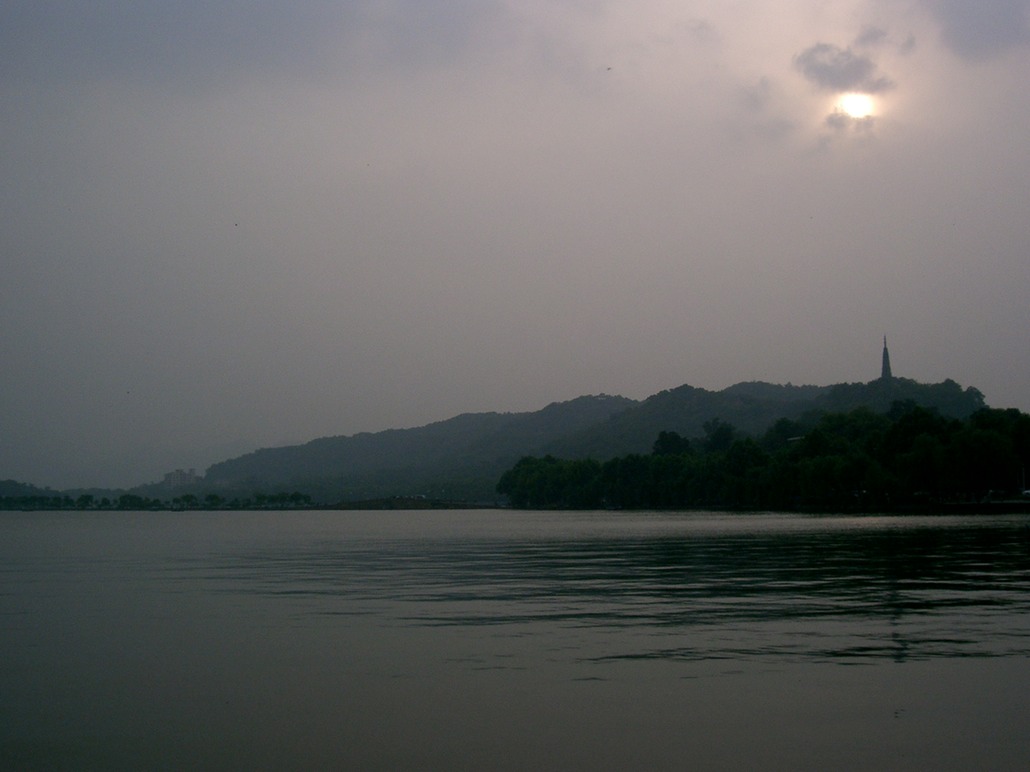
West Lake, Hangzhou, China
Today, the first of March, is the sunniest, warmest day we’ve had in months, I think, with the snow from last week’s storm pooling on the sidewalks and cascading from the scaffolding, and I’m reminded of a poem that I read during the writing of A THREAD OF SKY.
The poem, “The Modernist Impulse/On My Birthday,” is written by Melanie Rehak. It’s the only poem of hers I’ve managed to turn up (I can’t say I’ve done exhaustive research). It appeared in the New Yorkerabout six years ago, when I was living in Shanghai and depending on my dad to send me batches of the magazine a few times a year. To save postage, he would remove the ad pages and inserts, one by one. Somewhere between those torn edges, I came upon this poem.
The photo above is of West Lake in Hangzhou, China, one of the “must-sees” in A THREAD OF SKY. It’s the famed setting for the legend of Bai She (the white snake goddess), a legend that, in the book, gets retold by the characters, setting off a vicious argument about whether it’s a feminist parable or a tale of eternal love—and about everything else. To this day, West Lake is known to inspire romance—and, accordingly, fits of longing, bitterness, and heartache. Strolling around the lake, the six women, in all their fiercely maintained independence, find themselves as vulnerable as anyone to this.
All of the above is related to the poem only in the way that everything gets tangled in a novelist’s brain. And none of it is meant to shed light on the poem; I think the poem does that on its own.
Here it is:
The Modernist Impulse/On My Birthday
Has it ever been absent, this desire
for every moment to stand in relief,
the unending row of them set
like solitaires into what passes,
burnished to unbearable depths?
The park here is going green and all at once
its expanse is a moment of its own great making,
a flare in the midst of so much shattered.
The trees are certain their time has come.
I have never once been able to say yes,
now, this is the instant in which
I should begin to live again,
in which this love is the only love
worth having, the richest of all possible shining arts
to hold forth: Here,
I was here and I knew it.
In this neighborhood the slate
sidewalk piles up on itself all winter,
as it has for hundreds of winters,
cracked by the cold and heaving
into crazed shelter for the dirt below.
I roll back the stone from my life.
Oh my near-miss, return to me
now when I need you most. Come
and tell me that ages pass, that effort
is rewarded at the very least after we die.
I loved you as well as this sweet green park
coming into focus across the street,
all in delicate arrogance.
—Melanie Rehak

